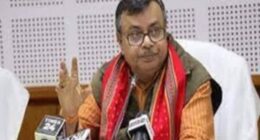- Dr. Pranab Sengupta , Advocate
- Religion holds a profound role in shaping individual and collective identities across the
globe. The connection between religion and identity is a complex and multifaceted one,
transcending geographic, cultural, and historical boundaries. This essay explores the role
of religion in identity, examining how it influences personal beliefs, communal affiliations,
cultural practices, and even political loyalties.
At its core, religion serves as a fundamental element in many people’s sense of self.
Personal identity often derives from the religious beliefs and values that individuals hold
dear. For instance, someone raised in a devout Christian family may identify strongly as a
Christian, while their beliefs, rituals, and moral principles form an integral part of their
identity. Similarly, individuals following Islam, Buddhism, Judaism, or any other faith often
find their religious identity to be a central component of who they are. These identities
encompass not only spiritual beliefs but also guide behavior, choices, and interactions in
daily life.
Religion is not limited to individual identity; it extends its influence to shape communal
identities as well. Communities, often defined by shared religious affiliations, provide
individuals with a sense of belonging and solidarity. Places of worship, religious festivals,
and cultural traditions rooted in religion foster a sense of community among like-minded
individuals. These communal bonds contribute significantly to one’s identity by fostering a
sense of belonging and providing a support network that aligns with shared religious values
and beliefs.
Cultural practices deeply intertwined with religion also play a pivotal role in shaping
identity. The arts, literature, music, and architecture influenced by religious beliefs contribute
to the rich tapestry of cultural identities worldwide. For instance, the architectural marvels
of Gothic cathedrals in Europe or the intricate calligraphy of Islamic art serve as potent
symbols of cultural identity rooted in religion. These cultural expressions become an
enduring testament to the influence of religion on shaping the identity of societies and
individuals alike.
Furthermore, the connection between religion and identity extends into the realm of
politics. In many regions around the world, religious affiliations play a significant role in
shaping political loyalties and ideologies. Political parties and movements often leverage
religious identity to mobilize support and pursue their agendas. The intersection of religion
and politics can be a potent force for change or conflict, with religious identities sometimes
becoming a catalyst for social and political movements.
However, the role of religion in identity is not without its complexities and challenges. It
can be a source of unity and solace, but it can also lead to division and conflict. Religious
differences have historically fueled tensions and even wars. The clash of religious identities
has resulted in discrimination, persecution, and violence in various parts of the world. In
such cases, religious identity can become a double-edged sword, both defining and dividing
ত্রিপুরায় ২১টি একলব্য মডেল আবাসিক স্কুলের অনুমোদন, চালু ১২টি
আগরতলা, ৪ ফেব্রুয়ারি,২০২৬ঃচলতি বছরের ১জানুয়ারি পর্যন্ত সারাদেশে ৭২৩ টি একলব্য মডেল…
- Tripur Live
- February 4, 2026
- 1 minute read
শিক্ষা ও স্বাস্থ্যখাতে ত্রিপুরার জন্য পাঁচটি প্রকল্পের অনুমোদন
আগরতলা, ৪ ফেব্রুয়ারি ২০২৬ঃডোনার মন্ত্রকের অধীনে ২০২২-২৩ থেকে ২০২৫-২৬ সাল পর্যন্ত…
- Tripur Live
- February 4, 2026
- 1 minute read
Tripura Sees Growth Pathway in Union Budget 2026–27
Agartala, Feb 4:For Tripura, the Union Budget 2026–27 is being seen as…
- Tripur Live
- February 4, 2026
- 2 minute read
Patient Welfare Panel Vows Improved Healthcare at GB Hospital
Agartala, Feb 4:The Patient Welfare Committee of GB Hospital convened on Wednesday,…
- Tripur Live
- February 4, 2026
- 2 minute read










